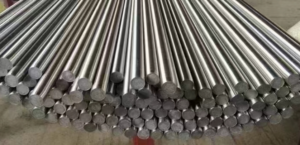Spring steels occupy a unique and vital position in the vast landscape of industrial materials, serving as the backbone of numerous applications requiring resilience, durability, and precision. As a seasoned expert in the field of metallurgy from Sino Special Metal, I’d like to delve into the spring steels for industrial springs, exploring their unique properties, types, applications, and the factors that influence their selection.

Spring Steels for Industrial Springs
Introduction to Spring Steels
Spring steels are a class of alloys designed specifically for their ability to undergo significant elastic deformation without permanent set or fracture. They are characterized by high yield strength, good ductility, and resilience, allowing them to return to their original shape after being compressed, stretched, or twisted. These properties are achieved through careful alloying and heat treatment, resulting in a microstructure that is optimized for spring applications.
Types of Spring Steels
The realm of spring steels is vast and diverse, with several sub-classes catering to specific needs and requirements. The most common classifications are:
- Low-Carbon Steels
These steels have a carbon content of less than 0.25%. They exhibit good ductility but lower yield strength compared to other spring steels. They are typically used in applications where moderate strength and good forming characteristics are desired. - Medium-Carbon Steels
With a carbon content ranging from 0.25% to 0.60%, medium-carbon steels offer a balance between strength and ductility. They are widely used in the manufacturing of springs for automotive, aerospace, and machinery applications. - High-Carbon Steels
High-carbon steels, with a carbon content exceeding 0.60%, exhibit exceptional strength and wear resistance but lower ductility. They are typically used in applications requiring high loads and limited deflection. - Stainless Steels
Stainless steel springs offer the advantages of corrosion resistance and high strength. They are commonly used in harsh environments where corrosion is a concern. - Alloy Steels
Alloy steels incorporate elements such as chromium, molybdenum, vanadium, and nickel to enhance specific properties like strength, toughness, or heat resistance. They are often chosen for applications with demanding performance requirements.
Applications of Spring Steels
The applications of spring steels are numerous and diverse, spanning multiple industries and use cases. Some of the most common applications include:
- Automotive Springs
From suspension springs to valve springs, automotive applications rely heavily on spring steels for their resilience and durability. - Industrial Machinery
Springs in industrial machinery, such as presses, lathes, and conveyors, require precision and reliability, making spring steels an ideal choice. - Consumer Products
Springs in everyday items like toys, door locks, and writing instruments often utilize spring steels for their cost-effectiveness and performance. - Medical Devices
Spring steels play a vital role in medical devices, from surgical instruments to prosthetic limbs, requiring precision and biocompatibility.
Factors Influencing Spring Steel Selection
Choosing the right spring steel for a given application is a multi-faceted process that involves considering several factors:
- Load Requirements
The expected load on the spring determines the required strength and stiffness of the material. - Environment
The operating environment of the spring, including temperature, humidity, and exposure to chemicals, must be taken into account to ensure material compatibility. - Cycle Life
The number of cycles the spring is expected to undergo determines the need for fatigue resistance and durability. - Cost
Cost considerations, including material price, processing costs, and overall life-cycle costs, are often a significant factor in material selection. - Regulatory Compliance
Certain applications, especially in the medical and aerospace industries, require compliance with strict regulatory standards, influencing the choice of material.
Advancements in Spring Steel Technology
With the advancement of metallurgical science and technology, spring steels continue to evolve, offering improved performance and new possibilities. Materials research focuses on optimizing existing alloys and exploring new combinations of elements to enhance properties like strength, ductility, and corrosion resistance. Additionally, advanced heat treatment techniques and manufacturing processes are being developed to further enhance the performance of spring steels.
Conclusion
Spring steels are a crucial component of numerous industrial applications, providing resilience, durability, and precision.
Thank you for reading our article and we hope it can help you to have a better understanding of the spring steels for industrial springs. If you are looking for spring steel suppliers and manufacturers online now, we would advise you to visit Sino Special Metal.
As a leading supplier of spring steels from Shanghai China, Sino Special Metal offers customers high-quality spring steel products at an extremely competitive price.




